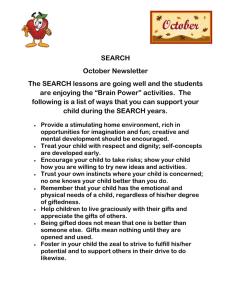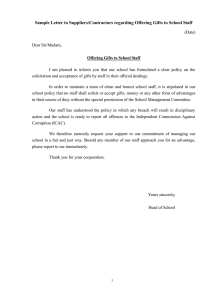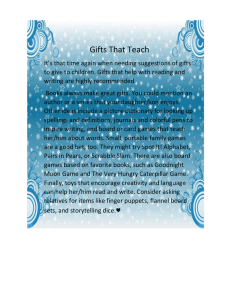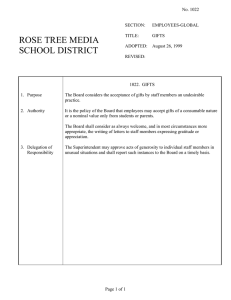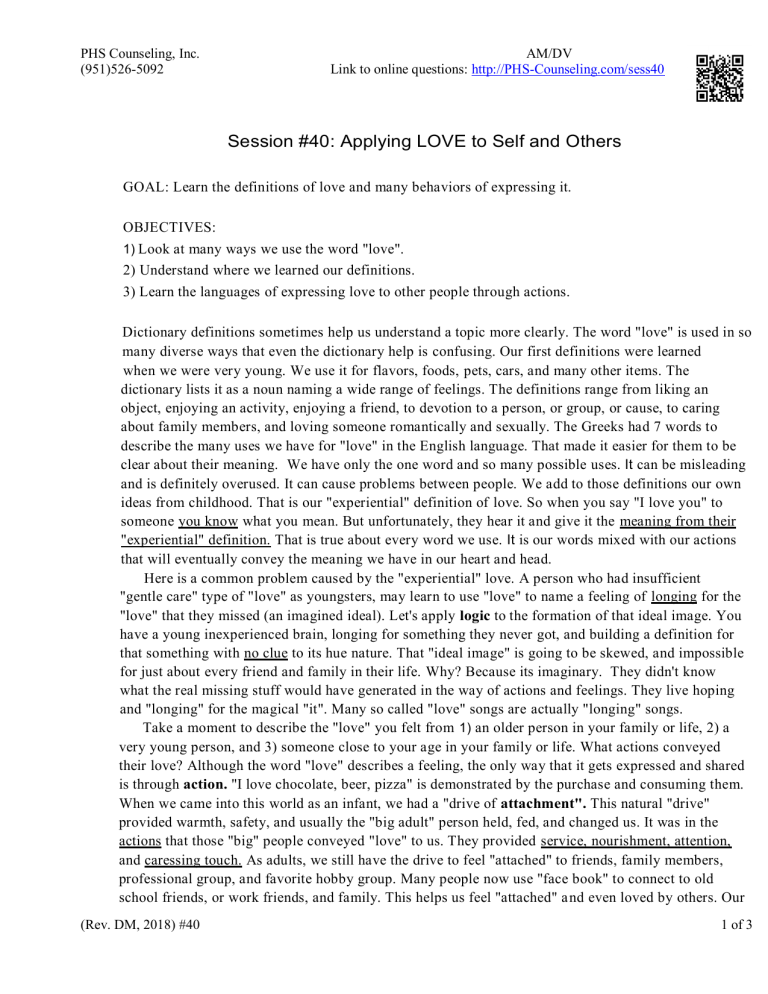
PHS Counseling, Inc. (951)526-5092 AM/DV Link to online questions: http://PHS-Counseling.com/sess40 Session #40: Applying LOVE to Self and Others GOAL: Learn the definitions of love and many behaviors of expressing it. OBJECTIVES: 1) Look at many ways we use the word "love". 2) Understand where we learned our definitions. 3) Learn the languages of expressing love to other people through actions. Dictionary definitions sometimes help us understand a topic more clearly. The word "love" is used in so many diverse ways that even the dictionary help is confusing. Our first definitions were learned when we were very young. We use it for flavors, foods, pets, cars, and many other items. The dictionary lists it as a noun naming a wide range of feelings. The definitions range from liking an object, enjoying an activity, enjoying a friend, to devotion to a person, or group, or cause, to caring about family members, and loving someone romantically and sexually. The Greeks had 7 words to describe the many uses we have for "love" in the English language. That made it easier for them to be clear about their meaning. We have only the one word and so many possible uses. It can be misleading and is definitely overused. It can cause problems between people. We add to those definitions our own ideas from childhood. That is our "experiential" definition of love. So when you say "I love you" to someone you know what you mean. But unfortunately, they hear it and give it the meaning from their "experiential" definition. That is true about every word we use. It is our words mixed with our actions that will eventually convey the meaning we have in our heart and head. Here is a common problem caused by the "experiential" love. A person who had insufficient "gentle care" type of "love" as youngsters, may learn to use "love" to name a feeling of longing for the "love" that they missed (an imagined ideal). Let's apply logic to the formation of that ideal image. You have a young inexperienced brain, longing for something they never got, and building a definition for that something with no clue to its hue nature. That "ideal image" is going to be skewed, and impossible for just about every friend and family in their life. Why? Because its imaginary. They didn't know what the real missing stuff would have generated in the way of actions and feelings. They live hoping and "longing" for the magical "it". Many so called "love" songs are actually "longing" songs. Take a moment to describe the "love" you felt from 1) an older person in your family or life, 2) a very young person, and 3) someone close to your age in your family or life. What actions conveyed their love? Although the word "love" describes a feeling, the only way that it gets expressed and shared is through action. "I love chocolate, beer, pizza" is demonstrated by the purchase and consuming them. When we came into this world as an infant, we had a "drive of attachment". This natural "drive" provided warmth, safety, and usually the "big adult" person held, fed, and changed us. It was in the actions that those "big" people conveyed "love" to us. They provided service, nourishment, attention, and caressing touch. As adults, we still have the drive to feel "attached" to friends, family members, professional group, and favorite hobby group. Many people now use "face book" to connect to old school friends, or work friends, and family. This helps us feel "attached" and even loved by others. Our (Rev. DM, 2018) #40 1 of 3 PHS Counseling, Inc. AM/DV actions are reaching out through the internet, and taking the time to read and respond. Each person feels noticed and has been given attention. But, there is no physical warmth, and you can't see their face and hear their voice to know their personal attentiveness. Romantic and love relationships are another way we attach to others. When the "chemistry" is right we feel drawn to the other person. There are many theories about this "magical chemistry". The chemistry does not maintain any level of logic or discernment. So we must keep our head functioning while we are under the romantic spell, and decide if this is a good attachment for us or not. Many divorces have come from one of the partners feeling a "chemical" attraction to someone, then jumping to the conclusion that because they "feel" it they must act on it. You may feel, but you do NOT have to ACT. When the chemical attraction comes while you are single and available, you are freer to act as you wish. But wisdom tells us that when you are married, this new "chemical reaction" is NOT love, but a , weird neurological response. It is wise to redirect yourself. There are many neurological responses. Consider the sneeze - which is very difficult to hold back. It is not reduced by "thinking it through". Little children are taught to use the potty rather than wetting and soiling their clothes. Thinking helps them withhold the impulses. By the time they are in school, they can wait for 1 1/2 hours until recess to use the restroom. We also make children wait until dinner-time for eating. Adults also manage many delayed responses. So tell yourself that NOT responding to an unwise romantic feeling is within your capability. Not responding could save the damage to your marriage, job, health, and other friendships. In the book, "The Five Love Languages", G. Chapman describes his findings about love expressions: #1) Words of affirmation. #2) Quality time. #3) Receiving gifts. #4) Acts of service. #5) Physical touch. They are actions. We all use them, and seem to have favorites for the giving, and the receiving. The happiest couples are those who recognize their partner's favorite love languages, and choose them to show their love. Love expressions are a matter of choice. The partner who prefers words of appreciation, will hear the love when their mate compliments them, encourages them, and verbally lifts them up when they are down. They get love notes on the pillow, or in the sock drawer, or on phone, text, or email message. You can find more ideas for compliments in adds in papers, magazines, TV and books. Also gather ideas by listening as people around you compliment and affirm each other. The partner who prefers quality time likes your undivided attention. That means turn the T V off, and face each other. It might mean taking a walk together, or doing something together that the partner likes. It may mean just hanging out together, just the two of you. Find out what quality time is for both of you. Receiving gifts appears to be one of the oldest behaviors that can be traced by anthropologists. It has been noted worldwide in the Mayan culture, the Aztecs, the Melanesian tribal people, and Polynesians. It's been noted in the ancient Japanese, and peoples of every continent. We huma ns seem to like giving gifts, as well as receiving them. Gift giving may "the fundamental expression of love that transcends all cultural barriers". The gift you choose to give reflects your culture, your heritage, and your awareness of your friend's interests and delights. Gifts are visual symbols of love. Relationships can develop their own special gifts. They may be expensive or low cost, purchased or hand made. If you have a partner who enjoys receiving gifts, you can have some fun trying different low cost items (serious, and funny). Acts of service are also popular expressions of love. It involves doing those activities that you know your partner would like you to do. They are usually simple everyday activities like: cooking a meal, setting the table, washing dishes, vacuuming, cleaning the bathroom, removing hair from the sink and counter, picking up dirty clothes and/or wet towels, getting the bugs off the windshield, washing the car/ truck, taking out the garbage, keeping the garage neat, keeping the clutter off the counter/desk, etc., changing the fish tank water, cleaning up after the cat, dog, or other pet, painting a room, changing the (Rev. DM, 2018) #40 2 of 3 PHS Counseling, Inc. AM/DV baby's diapers, trimming the shrubs, weeding, raking the leaves, walking the dog. Make your own list. All of the items take a little time and effort. That's where the love comes in. Do them with a positive attitude. This kind of love is concerned with the pleasure you give to the partner, not the effort used. Physical touch is a loving expression so common that we forget its power. From the time we kiss a baby's forehead, hold a toddler's hand, hug a friend to soothe them, we know our touch gives our love message. When we start dating we hold hands, embrace, and if the relationship shows lasting power, we add sexual touch and action. When we give a hug as we say "good morning", we increase the love message. The more we give these love messages, the stronger the attachment and love grows. Q. & A. 1) How did you learn about love? 2) What are your favorite expressions of love? 3) Which actions seem to generate more happy responses in your partner and children? 4) How can you help yourself keep sane if romantic love hits at the wrong time? (Rev. DM, 2018) #40 3 of 3
